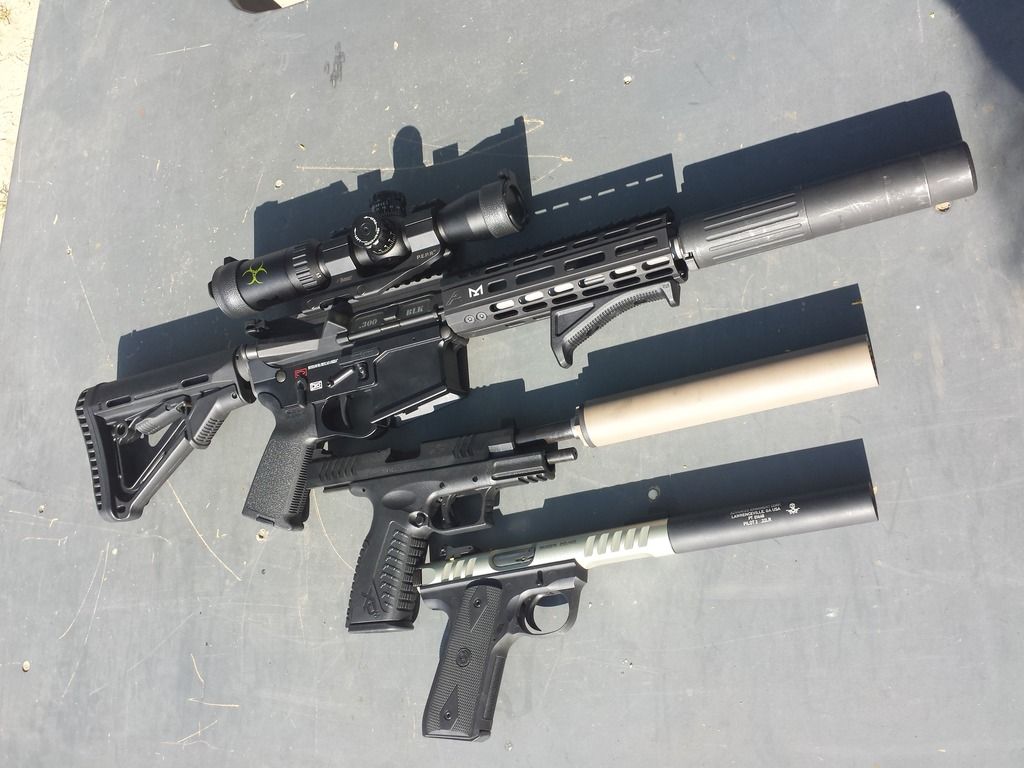Sharkbite said:
The only suppressed weapon i have any experience with that "slows" the bullet down is the MP5sd. It does that by means of a reflex type can over a ported BARREL. The ports allow gas to enter the can eariler and increases the sound suppression. That also reduces the pressure behind the bullet thus slowing it.
Another similar design is the Gemtech Mist-22, which is an integrally-suppressed 10/22 barrel. The Mist has a fairly common design that includes a port in the barrel just in front of the chamber that keeps most ammo subsonic. Normally, most .22 ammo is subsonic in a pistol but supersonic in longer barrels, but the hole in the barrel bleeds off enough pressure that most ammo stays subsonic even in the longer barrel of the Mist. Some other designs I've seen include multiple ports, but the idea is the same.
And the Mist is like the MP5-SD in that the bullet never actually slows down inside the barrel, instead it simply has less acceleration than in a similar-length barrel because of the ports. So instead of being slowed from supersonic to subsonic, it simply never reaches a supersonic speed to begin with.
I've also see designs similar to the MP5-SD used in full-power centerfire rifle suppressors. The idea wasn't to keep the bullet subsonic, it was simply to make the suppressor as quiet as possible. One design was a custom-suppressed Steyr bolt-action .308. Normal ammo still went supersonic, but the barrel ports and the reflex design made it quieter than any .308 can I've ever heard.
Sharkbite said:
No pistol can i know of slows bullets as they pass. In fact most cans "boost" speeds a small bit
A few current pistol cans use rubber wipes that the bullet passes through. These wipes are often used to keep an ablative from leaking out of the silencer, and they can also aid in the overall sound suppression process. Older designs used materials like leather or steel wool that the bullet passed through, and this also helped quiet the silencer even more than the baffles alone. These obstructions did slow the bullet down, but probably not by much. And the whole purpose of these designs wasn't to slow the bullet down, it was to help quiet down the propellant gasses even more than normal.
But these days baffle design technology has gotten good enough that modern silencers are super-quiet even without anything touching the bullet. So almost all modern silencer designs are just like Sharkbite says: Nothing touches the bullet; they don't slow the bullet down and they even can boost the bullet velocity a little bit. Though there are a few exceptions to this, the Degroat Nano and the Thompson Poseidon come to mind. These are micro cans designed to be shot "wet", and they have rubber wipes that hold in the ablative until you start shooting (they're also supposed to help the suppression process, but it's unclear how much difference they make compared to the ablative). In theory, the wipes will slow the bullet a little, but probably not by a noticable amount.
There are many different designs of silencers/suppressors, but the two words are still interchangeable and refer to the same thing.


